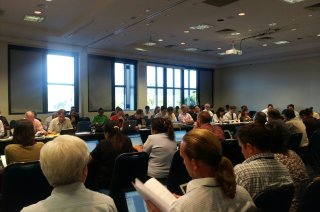
category_news
Disproportionate burdens and tropical tunas front and centre
Agnes Yeeting's blog post on the10th regular session of the Western and Central Pacific Commissionheld in the Convention Centre in Cairns-Australia. PhD researcher Agnes Yeeting and Postdoc researcher Dr. Megan Bailey are attending the meeting as part of their research in relation to the BESTtuna programme.
Day 1 at WCPFC-10:
The 10th regular meeting of the Western and Central Pacific Fisheries Commission (WCPFC) is being held in the Convention Centre in Cairns-Australia. PhD researcher Agnes Yeeting and Postdoc researcher Dr. Megan Bailey are attending the meeting as part of their research in relation to the BESTTuna research programme. The meeting will last from 2nd December to 6th December, and began with an official welcome by the representatives of the indigenous people of Australia. Highlights of the opening of the Meeting included the welcoming of Indonesia as a Contracting Party and full member of the Commission.
Day 1 of the meeting focused on two proposals put forward in relation to new Conservation and Management Measures (CMMs) for tropical tuna. The two proposals are the US proposal and a joint proposal by PNA countries (the Parties to the Nauru Agreement) and Japan. Major points in the joint PNA-Japan proposal seeks i) A three months ban on the use of FADs plus 4 months ban on FAD use ii) Full or seasonal closures or establishing effort limits on the number of days fished in the high seas and iii) Catch limits for bigeye tuna catch on longline vessels, monthly reporting on catches and a 100% observer coverage on longline vessels. PNA members believe that their joint proposal represents a well-balanced approach proposing both FAD control (for purse seine) and cuts in longline catches. Details of the measures to achieve these objectives still need to be worked out and will hopefully be agreed in this WCPFC 10 meeting as a way forward. But PNA, a strong regional cooperative of eight countries, want distant water fishing vessels to cut their longline fishing level by at least 30%, and share the burden of conservation. One PNA and Forum Fisheries Agency (FFA) member strongly emphasised the need for “fishers, whether domestic or foreign, to pay for conservation costs in relation to their activities in the region and should be taken off of access fees”. The issue of disproportionate burden has been one of the important issues under discussion, and a special requirement for SIDS (Small Islands States and Territories) was proposed by PNA and FFA. But a number of fishing nations are seeking clarification on the definition of “SIDs” and concerns are being raised on the extent of application for these special requirements.
Learning the position of some SIDs, like Kiribati, with whose delegation Agnes is attending, is undeniably depressing. Kiribati argued they have a unique position given the geographical nature of their location and the separation of their contiguous EEZ by the two high seas. They urged other Commission Members to recognise their special circumstances with regards to seasonal high seas closures, and have made it clear that they are willing to work with others to compromise and determine ways forward to support CMMs for sustainability that will not disadvantage any member.
On Monday a small Tropical Tuna Working Group convened to discuss the full extent and content of the new CMM proposals regarding skipjack, yellowfin and bigeye, but it is still not agreed upon as to whether effort limits would be based on the 2009 level, or the 2010 to 2012 level. Discussion in the plenary and Working Group is ongoing and will continue Tuesday and Wednesday, so stay tuned in hopes of progress!